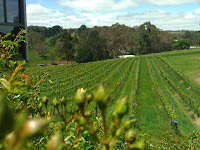In what felt like a very packed week it was still possible to find the odd oasis of amusement and fun. Waiting for me on Monday was a copy of a letter from Ian Dalton, Senior Responsible Officer, FT Pipe Line (what a job title!). In this letter Ian sets out the NHS plans for an all Foundation Trust Provider Landscape by 2014. The letter is a delight of metaphorical ambitions, there is much talk of tough journeys, challenging journeys, the amount of the work the journey will entail, next steps, steps to be taken as organisations start off on their journey – a journey to establish a FT pipeline across the English Landscape. It’s wonderful stuff and the letter is a delight to anyone remotely interested in doing some content analysis.
It was on the 3rd October 2011, that the NHS North East, NHS North West and NHS Yorkshire and the Humber - the three strategic health authorities in the North of England - were placed under a single management framework now known as NHS North of England. And Ian is, of course also the Chief Executive of the NHS North Strategic Health Authority. What some people might not know is that while working for the Department of Health, Ian was seconded to the Foreign Office and posted to Basra. There he oversaw the reconstruction of health services following the Iraq war.
Tuesday night involved a Silver Service Dinner at the Bistro East, at the Manchester College, Openshaw. The meal was a celebration of some early successes with the Single Ticket project. The Single Ticket programme was developed by Manchester College, and a number of high profile partners from health and social care, inckuding our School. It aims to give the residents of Manchester and Salford an opportunity to gain experience of working in health care and gain a BTEC Health and Social Care qualification. The students on the programme gain experience in mental, adult and children’s health care through varied work placements. The first of the successful students to gain jobs were guests and hearing their stories was a real privilege.
Colleagues from Solleftea in Sweden were also guests and dinner provided the opportunity to hear of their experiences in delivering similar projects and to explore where we might work together in the future. The food was prepared and served by the College’s catering students. Whilst the food wasn’t entirely my taste the presentation was absolutely awesome and there were some fantastic food creations.
Last week saw the closure of the traditional maternity services in Salford. And on Wednesday evening I attended the opening of a new Birthing Centre in Bolton. Champagne and canapés were the order of the night. This was a private birthing centre offering a range of services from fertility advice through to birth. The opening of the centre coincided with the first reports of the Birthplace in England research programme. Birthplace is an integrated programme of research and is made up of several interrelated studies designed to provide evidence about important childbirth outcomes for women, their partners, and health professionals. This information will help all those involved take informed decisions over chosing where baby might be born. The research outcomes will also help policy makers and service providers to provide the highest quality and most cost-effective maternity care services.
However, some of us don’t have any choice over certain aspects of our lives. Despite the colder weather arriving, this week Cello was taken for what I am sure he hopes will be his last hair cut of 2011. His coat had become long, curly, slightly unruly and absolutely ginger in colour. After having a Christmas Trim, he does look smarter, can run and swim further, and his coat has returned to his original and lovely chocolate brown colour. However as I write this post there is a gale blowing outside and the rain is lashing against the windows. I can see it might be difficult to get him out of his bed for a walk this morning!




















